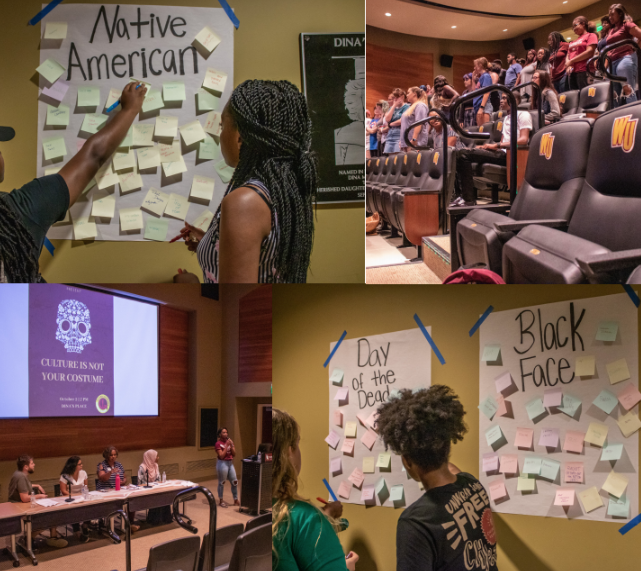Halloween is right around the corner, which means trick-or-treating and costume parties for Winthrop students. However, it’s important to not only be creative but to be cautious on making sure your costume isn’t appropriating other cultures.
The Winthrop University Diversity Peer Educators hosted a panel called “Culture Is NOT Your Costume” with the York County Catawba Indian Nation, Winthrop College of Education and the Muslim Student Association. The cultural event was hosted in Dina’s Place at the DiGiorgio Student Center on October 2nd at 7 p.m., and aimed to educate students about cultural appropriation during Halloween. Senior Political Science and Psychology major Kalea Young-Gibson explained that it is important for students to be informed about other cultures and their history in our nation.
“This topic is important because Winthrop champions diversity, inclusion, and acceptance. There are a lot of cultures represented at Winthrop, and we can’t see the beauty in that through being uninformed about these same cultures and people,” Young-Gibson said.
The event began with the Diversity Peer Educators placing posters which phrases such as “The Day of the Dead”, “Geisha” and “Native Americans” and asked students to answer what they know about those subjects and the meaning behind them. It was also accompanied by a slideshow of examples of cultural appropriation such as blackface, Indian costumes and sexualized Muslim costumes to give students perspective of how the topic is present in today’s society.
“It’s everywhere. You can walk into major or local Halloween or department store and the costumes being sold are based off nothing but stereotypes, and little to no work is being done by these companies to at least try to properly represent the culture they are trying to recreate,” Young-Gibson said.
Assistant Professor of the College of Education Sharell Fuller was among the panelists during the event, which served to answer questions by students on how we can educate ourselves on different cultures and how we can learn outside of media such as Disney.
“I’m eager to engage in conversation with someone who is ignorant or uses stereotypes” Fuller said, “We’re all ignorant about everything and how else are we supposed to learn.”
“I’ve always loved learning about different cultures, but the event itself came about when my friend and co-worker Erin brought up her frustrations with people appropriating parts of Turkish culture that meant a lot to her, like spreading misinformation about the Turkish goodbye. From there, she suggested that we dedicate an entire event to appreciating instead of appropriating cultures. Halloween was just the perfect time to do it,” Young-Gibson said.
One of the discussions during the event cited cultural appropriation as a form of plagiarism for people and cultures, which can distort the meaning behind cultural aspects, and how we explore other cultures in mediums such as music.
“It’s adapting aspects of some else’s culture without giving credit to it” Fuller said, “You can’t be prejudiced to the people and just love that person’s culture.”
Students who participated also received a check-list to determine whether their costume tries to represent an entire culture or mock cultural and religious symbols. This was a way for participants to apply what they’ve learned to everyday life and help prompt dialogue.
“I hope that students will leave feeling like they’ve learned about the cultures of others and what they mean to people on an individual basis. Lots of people hold their culture close to their hearts, and this is a love that should be shared with the world,” Young-Gibson said.
Students can learn about other cultures through research on specific elements, important cultural milestones, and books that offer different perspectives from other cultures instead of the Western perspective. “As an educator, literature is one of the best ways [to learn more about other cultures]” Fuller said, “You need have to do the work and search out the voices of what you’re searching for.”
An important message to students from the event is to rely on common sense when considering what costume is appropriate and to be creative. “Follow your gut. If you have to even think about questioning it – you probably shouldn’t wear it. Avoid words in the costume title such as: ethnic, traditional, tribal, sacred, urban, and other ‘descriptive’ words that are actually cultural indicators,” Young-Gibson said.
Photos: Olivia Esselman/ The Johnsonian




